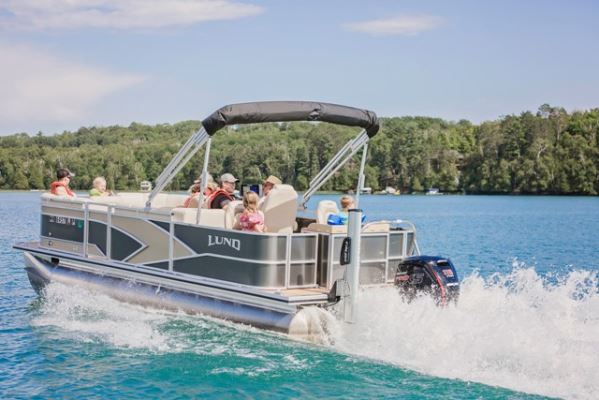 I must admit I enjoy going fast when the opportunity presents itself and I love the feeling of the wind blowing through my hair. However, when it comes to boats, it’s important to understand some engine sizes are a better fit than others and it really does come down to your own specific needs.
I must admit I enjoy going fast when the opportunity presents itself and I love the feeling of the wind blowing through my hair. However, when it comes to boats, it’s important to understand some engine sizes are a better fit than others and it really does come down to your own specific needs.
Now, most pontoon owners probably don’t need an engine that's big enough to power an 80-foot yacht, “probably” being the key word here. Let's dive into the advantages and disadvantages of having a one engine or a twin setup on your boat and to see how much horsepower you’ll actually need.
Highs & Lows Of Lakes
Not all lakes are the same, and that can certainly change your viewpoint on which engine to use for your pontoon or deck boat. Rocky Mountain Boating Company (www.romboco.com) in Colorado recommends a bigger outboard if your boat is situated at a higher elevation. Locations such as Lake Dillon in Colorado, Lake Tahoe on the California/Nevada border, and many others should cause boaters in these regions to think twice when selecting an engine.
Having boated on a highly elevated lake myself, my family and I simply used a single engine to get around the lake. However, many dealers such as Sean from Keith’s Marina (www.keithsmarina.com) in Wisconsin or Ryan from Socks Marina (www.socksmarina.com) in Indiana believe a twin engine is needed if you are accessing larger bodies of water, regardless of the elevation. They recommend twin outboards and feel they will give you more of a boost so you can get where you need to go faster and cover the larger amounts of water.
 Power For Times Of Trouble
Power For Times Of Trouble
Neil from Rocky Mountain Boating also pointed out that more engine power might be necessary if a surprise storm occurs. With increased engine power, you’ll be able to get back to the dock quickly without trying to outrun any rain or lightning. However, Neil simply recommends a single engine with more horsepower with 70hp being the minimum for smaller boats in the 18- to 19-foot range and at least 150hp on larger boats up to 25 feet long.
Sean from Keith’s Marina recommends boats longer than 18 feet should stay above at least 40hp depending on the size of your lake; however, Ryan from Socks Marina simply recommends customers get the max horsepower the boat is rated for, feeling the bigger your boat, the bigger engine you’ll need.
New VS Experienced
When it comes to new versus experienced boaters, there certainly is a difference. For instance, Tim from Wyland’s Marine (www.wylandsmarine.com) states that most experienced boaters or repeat buyers go for larger boats with twin engines. In fact, he’s found that a 175hp is actually one of their most popular engines with 150hp and 250hp and higher following close behind. He's observed that in general, experienced boaters seek more speed. Yet when it comes to new or beginner boaters, most dealers would still recommend a lower horsepower outboard. The dealers we spoke with agreed that it helps boaters get a feel for things when starting out and helps them avoid taking on speeds they aren’t better prepared for. Sean from Keith’s Marine simply recommends starting new boaters out between 60hp and 150hp.
.JPG_600.jpg) What Do I Buy?
What Do I Buy?
So which engine is right for you? A lot depends on where you’re located and what boat you own or plan to buy. For those in high elevation areas, a single engine with a high horsepower capacity might be best. If you're going to be boating on large bodies of water you might not need twins, but you should at least consider a 200hp outboard or larger if you're an experienced boater. Always seek the opinion of your local dealer when making the final decision on power. If money is tight, it might be best to go with a smaller model or take fewer options instead of choosing to underpower your new pontoon or deck boat. In the end it's best to find the right size that fits your needs and situation which will most likely be a single outboard. For those looking for a little more power consider twins but it's best not to overdo it. Safety and serenity should come before high speeds.